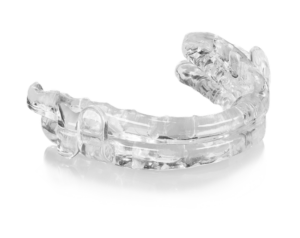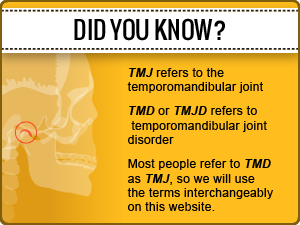Grinding Teeth
Bruxism, Clenching & Anterior BracingAre you grinding teeth?
Do you find that you grind your teeth a lot? Sometimes, you just don’t know that you are doing it until someone else notices and asks you about it.

Teeth grinding is also called ‘bruxism’ and has a number of different causes. Teeth grinding can be painful and have an effect on your temporomandibular joint (TMJ), which is the joint between your jawbone and the rest of your skull.
There are many variations on bruxism; Nocturnal Bruxism is the term used for bruxism that occurs during sleep. Bruxism can be divided into grinding, clenching, and anterior bracing. Grinding and Clenching simultaneously is the most damaging of all nocturnal bruxism but severe damage can be caused by just grinding or just clenching. Frequently the most severe damage to teeth is seen with grinding and gastric reflux or GERD.
It can be caused by a sleep disorder like obstructive sleep apnea (OSA). Nocturnal bruxism in patients with sleep apnea or upper airway resistance syndrome actually is a protective response to airway closure. When the airway collapses clenching and/or grinding stiffens the oral and hypopharynx to maintain an open airway. This may be a lifesaving effect of bruxism. GERD frequently occurs in patients with snoring and sleep apnea.
If you suffer from depression you may have been prescribed a type of antidepressant known as a selective serotonin reuptake inhibitor (SSRI). This class of drugs includes fluoxdetine, setraline and paroxetine and have been associated with bruxism, too. Excessive smoking and alcohol consumption can also give rise to bruxism. Frquently drugs used to treat ADD and ADHD can cause severe bruxism.
The implications of teeth grinding
Teeth grinding is a dental problem as teeth can be damaged – sometimes beyond repair. The teeth can have severe wear, fractures and chipping. Your temporomandibular joint are also affected, meaning bite correction may be required to repair the damage.
If you are grinding your teeth while you are asleep you may not be fully aware of the damage it is doing to your them. Your partner will know better than you by the sound of your teeth making grinding, clenching and gnashing noises all night. Bruxism associated with sleep apnea and gastric reflux is more destructive.
Bruxism can make you look much older than you are.
When there is excessive grinding of the teeth there is a loss of vertical dimension, or your face gets shorter as your teeth wear down. The muscles and soft tissues of you face are now compressed with closure giving a permanent frown that often looks like your angry. Wrinkles occur you over closure does not support your face.
Stop the wear and tear
The first way you can help bring a stop to teeth grinding during sleep is to wear a splint or teeth grinding guard at night. When the custom made mouthguard is fitted between your lower and upper teeth it creates a barrier so that it protects both sets of teeth.
The mouthguards look like the ones used by boxers. We get them fabricated from a flexible rubber or plastic material which fits comfortably in your mouth. We can also get a mouth splint made up of harder plastic which fits exactly over your lower or upper or lower teeth.
Another appliance we sometimes use is a mandibular advancement device (MAD), normally used for the management of sleep disorders, like snoring and obstructive sleep apnoea. This device can help prevent bruxism and damage from bruxism. It will frequently eliminate nocturnal gastric reflex as well.
The device comprises of two mouth guards (one for the bottom teeth and the other for the top teeth) that are welded to form one piece. You wear it in your mouth throughout the night and it keeps your bottom jaw forward and closed while you sleep.
Prosomnus Appliance
Find out which treatment is right for you: The wrong treatment may make you worse!
If you are prone to teeth grinding and it is beginning to damage your teeth, it is wise to have a thorough evaluation to discover what is causing it. There may be other factors which can be tackled, like smoking, medication and alcohol consumption which all need to be addressed, too.
When you make a decision to reduce your teeth grinding with the help of dental treatment we can fit you with one or another of the modern devices which we have available, which can provide an effective solution.
Bruxism is frequently associated with sleep apnea but what many dentists don’t know is that some types of bruxism appliances can make sleep apnea more severe. Ideally a dentist board certified in Dental Sleep Medicine should be consulted for sleep apnea and snoring treatment. Their expanded knowledge into sleep disorders can make an enormous difference in the type of appliance selected.


0 Comments